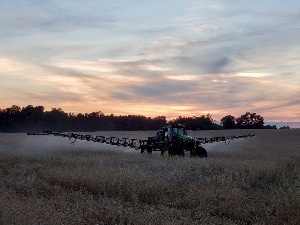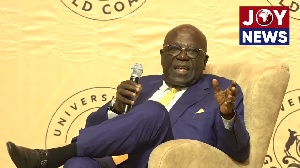Africa News of Tuesday, 3 June 2025
Source: www.ghanawebbers.com
Africa: From Kansas to Kakuma - How Us Wheat Helps Power Humanitarian Aid
American Farmers Help Fight Hunger with WFP
Doug Keesling's wheat field in Chase, Kansas, is vast. The young plants are starting to sprout grain. However, Keesling is worried. "We've had plenty of sun," he says. "We need rain now; we've been in a drought."
In northwestern Kenya, refugee Waad (surname withheld for safety) knows drought well. But it was conflict that forced her from Sudan's Nuba Mountains.
Now a mother of three, Waad lives in a small tent at Kakuma refugee camp. Most of the 300,000 residents rely on World Food Programme (WFP) rations to survive. "The food from WFP is the only thing most of us know," she says.
Kansas and Kakuma are linked by hunger and agriculture. Kansas farmers like Keesling grow nearly one-quarter of America's hard red winter wheat. This grain is vital for WFP's assistance to refugees and vulnerable groups.
The connection between Kansas and food aid has history. In 1953, farmer Peter O'Brien suggested using surplus harvests to feed hungry nations. This idea led to the birth of food assistance in the U.S., followed by WFP's founding less than a decade later.
"It's a history our farmers are proud of," says Justin Gilpin, CEO of the Kansas Wheat Commission. They take pride in helping feed people worldwide through WFP’s efficient system.
Wheat farmers are crucial to WFP's operations. In Western Nebraska, the New Alliance cooperative packages beans for WFP and other humanitarian efforts in Haiti and Africa.
"For our Nebraska farmers, profit is key," says manager Dave Weber. "But they appreciate that their beans may save lives."
U.S.-purchased food reaches those in need through various routes. Keesling's wheat travels by rail to Texas ports before heading to East Africa by cargo ship.
"We're covering all the region," says Emilie Dufour from WFP Mombasa office about their work across nine Eastern African countries.
Once in Mombasa, the wheat undergoes quality checks before being trucked over 1,200 km to Kakuma camp. "It moves quickly because it's programmed for monthly distributions," explains logistics officer Jairus Mutisya.
In April, Gilpin visited Kakuma with U.S. farmers to see WFP operations firsthand and understand where their harvests go.
They witnessed significant cuts in international aid: a 40 percent reduction in food assistance for Kakuma refugees. Without more funding, refugees will receive just 28 percent of their daily recommended rations starting June.
"It was impactful to meet refugees and hear how aid helps them," Gilpin reflects on their challenges due to ration cuts.
Waad describes WFP support as "the only lifeline" for families like hers but must find new ways to feed her children amid ongoing cuts.
"I started keeping chickens," she shares about her small efforts at self-sufficiency. "Sometimes we sell eggs or birds; it helps."
When U.S. wheat farmers visited Kakuma, Waad appreciated their encouragement towards farming initiatives: “If that means helping me grow my poultry business or do vegetable farming, it will really help.”
Waad fled Sudan ten years ago during escalating violence near her home with four younger siblings after walking days through harsh terrain before reaching Kakuma via Juba.
"I believe hunger can end through hard work," she asserts firmly against dependency on others for survival.
Kansas farmer Keesling has also met refugees like Waad during his involvement with food aid over 25 years after missions abroad for the Kansas wheat industry.
"Africa has always been close to my heart,” he states about understanding how African farmers can succeed while witnessing hunger’s impact firsthand alongside success stories like an Ethiopian woman who opened an orphanage after overcoming adversity with support from WFP.
Keesling recalls his grandfather overcoming poverty nearly a century ago through determination: winning a fight helped pay off family debts so they could start anew.
"Midwest farmers have hearts for helping neighbors—no matter how far away,” he emphasizes about giving hope through food assistance leading towards solutions amidst struggles faced globally today.
WFP’s operations at Kakuma rely on funding from several sources including ECHO (European Union Humanitarian Aid), Germany, Japan, Saudi Arabia, South Korea, UK & USA.











